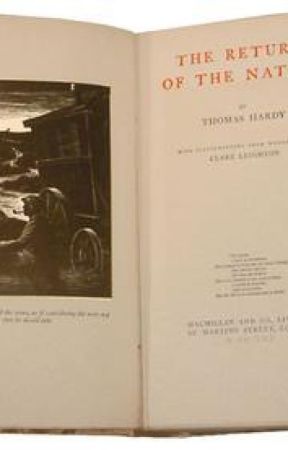Cheerfulness Again Asserts Itself at Blooms-End, and Clym Finds His Vocation
Anybody who had passed through Blooms-End about eleven o'clock on the morning fixed for the wedding would have found that, while Yeobright's house was comparatively quiet, sounds denoting great activity came from the dwelling of his nearest neighbour, Timothy Fairway. It was chiefly a noise of feet, briskly crunching hither and thither over the sanded floor within. One man only was visible outside, and he seemed to be later at an appointment than he had intended to be, for he hastened up to the door, lifted the latch, and walked in without ceremony.
The scene within was not quite the customary one. Standing about the room was the little knot of men who formed the chief part of the Egdon coterie, there being present Fairway himself, Grandfer Cantle, Humphrey, Christian, and one or two turf-cutters. It was a warm day, and the men were as a matter of course in their shirtsleeves, except Christian, who had always a nervous fear of parting with a scrap of his clothing when in anybody's house but his own. Across the stout oak table in the middle of the room was thrown a mass of striped linen, which Grandfer Cantle held down on one side, and Humphrey on the other, while Fairway rubbed its surface with a yellow lump, his face being damp and creased with the effort of the labour.
"Waxing a bed-tick, souls?" said the newcomer.
"Yes, Sam," said Grandfer Cantle, as a man too busy to waste words. "Shall I stretch this corner a shade tighter, Timothy?"
Fairway replied, and the waxing went on with unabated vigour. "'Tis going to be a good bed, by the look o't," continued Sam, after an interval of silence. "Who may it be for?"
"'Tis a present for the new folks that's going to set up housekeeping," said Christian, who stood helpless and overcome by the majesty of the proceedings.
"Ah, to be sure; and a valuable one, 'a b'lieve."
"Beds be dear to fokes that don't keep geese, bain't they, Mister Fairway?" said Christian, as to an omniscient being.
"Yes," said the furze-dealer, standing up, giving his forehead a thorough mopping, and handing the beeswax to Humphrey, who succeeded at the rubbing forthwith. "Not that this couple be in want of one, but 'twas well to show 'em a bit of friendliness at this great racketing vagary of their lives. I set up both my own daughters in one when they was married, and there have been feathers enough for another in the house the last twelve months. Now then, neighbours, I think we have laid on enough wax. Grandfer Cantle, you turn the tick the right way outwards, and then I'll begin to shake in the feathers."
When the bed was in proper trim Fairway and Christian brought forward vast paper bags, stuffed to the full, but light as balloons, and began to turn the contents of each into the receptacle just prepared. As bag after bag was emptied, airy tufts of down and feathers floated about the room in increasing quantity till, through a mishap of Christian's, who shook the contents of one bag outside the tick, the atmosphere of the room became dense with gigantic flakes, which descended upon the workers like a windless snowstorm.
"I never saw such a clumsy chap as you, Christian," said Grandfer Cantle severely. "You might have been the son of a man that's never been outside Blooms-End in his life for all the wit you have. Really all the soldiering and smartness in the world in the father seems to count for nothing in forming the nater of the son. As far as that chief Christian is concerned I might as well have stayed at home and seed nothing, like all the rest of ye here. Though, as far as myself is concerned, a dashing spirit has counted for sommat, to be sure!"
"Don't ye let me down so, Father; I feel no bigger than a ninepin after it. I've made but a bruckle hit, I'm afeard."
"Come, come. Never pitch yerself in such a low key as that, Christian; you should try more," said Fairway.

YOU ARE READING
The Return of the Native (Completed)
ClassicsThe Return of the Native is Thomas Hardy's sixth published novel. It first appeared in the magazine Belgravia, a publication known for its sensationalism, and was presented in twelve monthly installments from January to December 1878. Because of the...
